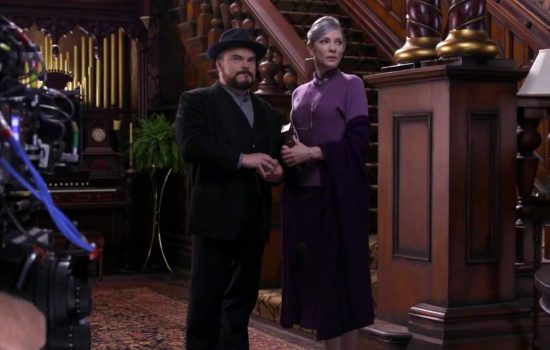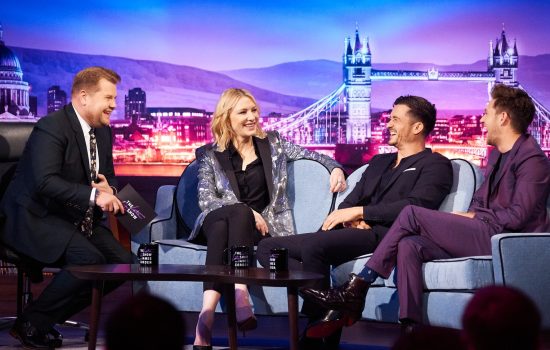From the Q&A with the SAG-AFTRA Foundation on November 13,





and a special from Film4, with new exclusive footage from the film















Cate Blanchett on Why ‘Carol’ Is Not Your Average Love Story
“I think the audience feels like they’re seeing something dangerous and uncharted,” the Oscar-winning actress sayso… they split-screened him? Or was it one of those director’s commentary things?” Cate Blanchett is having some trouble wrapping her head around Shia LaBeouf’s latest stunt. The actress hasn’t heard about the #ALLMYMOVIES project, in which her Indiana Jones and the Kingdom of the Crystal Skull co-star spent 58 hours screening all of his films, as the world watched a close-up of his face via live-stream. “God,” she exhales, placing her fork on the breakfast plate in front of her as her eyes widen. “The idea of sitting and watching all the movies I’ve done over again sounds like a nightmare!”
A marathon viewing of her film career would double as a crash course in the most indelible and transporting performances of the last 20 years. Her range is astonishing: She’s an actress capable of portraying both English and Elvish royalty, as comfortable inhabiting Katharine Hepburn (The Aviator) as she is Bob Dylan (I’m Not There). And as the titular character in Todd Haynes’ new film, Carol, Blanchett takes on yet another layered, complex role — the Platonic Ideal of a posh New Jersey housewife circa 1950 who’s thunderstruck by a young Manhattan shopgirl named Therese (Rooney Mara). The heart-stopping romance born from their chance encounter is as touching and real as any the movies have ever seen.
A long-in-the-making labor of love for the actress, Carol has been a part of Blanchett’s life for so long that she naturally slips into the socialite’s cadence when reflecting on its journey to the screen: “It’s been on and off and up and down,” she says, waving a limp hand through the air. “Normally, when things take such a long time to happen, everyone’s so desperate to get it made that they’ll just do it in whatever way they can. [But] there hasn’t been any creative compromise here, and that’s pretty rare.” Rolling Stone met with Blanchett in a hotel suite overlooking Central Park, where we spoke to the actress about her new film, forbidden love, and the power of her celebrity.
Your character almost seems like a synthesis of several of your previous parts, from Galadriel’s impenetrable aura to Katharine Hepburn’s pluck. Did the role feel like something you’d been working towards?
Every actor has a bag of tricks, but I think you really have to leave that in the trailer as much as you can. I’d been sitting with the idea of playing Carol for a long time; there were [enough] layers of sediment collected about the character that by the time we shot I didn’t have to think about it. What Rooney and I both loved — and it was in-built into the script — is that there are all these pregnant silences between Therese and Carol. Every word, every situation is incredibly loaded.There were so few words available to these women to describe their feelings for one another.
I guess it was “perversion.” Homosexual love was illegal, but love between two women was considered a byproduct of hysteria. It wasn’t even accorded the place of being a criminal act, in a way. Because the love story here is between two women, I think the audience feels like they’re seeing something dangerous and uncharted, in the same way that anyone — whether they’re transgendered, bi, straight, lesbian, gay — does when they fall head over heels for someone for the very first time. But I think what Todd was interested in bringing out was the sensation of being in love profoundly for the first time. It feels as if you’re inventing the wheel.The way Carol and Therese look at each other is in complete defiance of how they’re seen by the men in their lives.
I think what Todd is really harnessing, through so many of his references to female photographers in the Fifties — it’s a female gaze, as opposed to the traditional male one. But I suppose a point of connection for me with Carol is that someone’s gender is never my first connection to them. I have a much more energetic connection to people. Unlike Therese, who’s sort of thinking: “I’m feeling this, but I don’t know what it is, because she’s a woman,” Carol’s sense of sexuality is very integrated. Her issue is how to maintain her dignity and her privacy and her connection with her child in that environment. It’s not a perversion.When Carol finally peels off Therese’s shirt, she whispers: “I never looked like that.” It’s a line that’s not in the book — what’s she is thinking in that moment?
I think it just draws back to that you’re reminded that gender is not an impediment between these two women. The age gap, the gap in experience, their difference in class… that’s huge. So she is looking at this young girl at the beginning of her life and thinking: “I’m in an entirely different psychological space, with a whole sway of heartbreak that I’m carrying with me in my little satchel — and you’re so young.” Carol has always been very secretive, and she’s a quintessential Highsmith creation: Someone who has thoughts and feelings that are considered perverted by the people around her, feelings that she’s had to keep very close to herself.There’s a musical quality to how Carol speaks; did finding her voice require a lot of…
Smoking? There was a lot of smoking. I mean, obviously it’s the time, but it’s a very erogenous zone, the mouth.Are you ever conscious of the effect that your celebrity might have on a performance?
I’m more conscious of that onstage, actually. I was just in a play in Sydney, a reinvention of Platonov called The Present. You might drive an audience to come see the play through one’s so-called “celebrity,” but hopefully you can then say: “The play is not actually about me.” But I don’t think that I have the kind of celebrity that you’re referring to. I certainly don’t have it in my house.You were in A Streetcar Named Desire at BAM a few years ago as well.
Oh my goodness! That was a long time ago. There were offers to take that to Broadway, and we really wanted to go, but you know… kids. People are often put off from theatre because if you have a bad experience you’re so much more implicated as an audience member; you feel kind of pissed off at yourself and pissed off at the form,. It can drive people away, so you have a huge responsibility to the art form to bring out the veracity of it. The theatre can be a really impolite and dangerous place.Do you feel like your craft has improved since your tenure at the Sydney Theatre Company?
Well, I went to a theatre school, so it’s always been my first port of call. Not that I think it’s more important than film — fortunately, I’ve not been placed in a position or forged a career where it’s an either/or situation. But definitely producing the work of other people, running the company and being so continuously on stage for the last eight years, I hope I got better! You know, we were very accountable, because my husband and I were co-CEOs of the company, artistic directors, and I was there as an actress. So I had to develop a very, very well-honed accountability to an audience.You recently said that your Oscar-winning performance in The Aviator left you “filled with disappointment and regret.” It really hasn’t gotten easier for you to live with your work?
The first day on set is always like the first day of school. The feelings of anxiety and wanting to do the best thing that you can but not knowing the best way to do it. But that’s why you do it; the process is to find out. And then the last day of shooting is always, “What the fuck did I do?” I’ve learned to let that go. It’s good to see the finished product once, because then you think “that worked…and that didn’t work.” You do get more used to seeing yourself over time. But the only use of watching your work is to take the good and do something about the bad.
via Rolling Stone
 Welcome to Cate Blanchett Fan, your prime resource for all things Cate Blanchett. Here you'll find all the latest news, pictures and information. You may know the Academy Award Winner from movies such as Elizabeth, Blue Jasmine, Carol, The Aviator, Lord of The Rings, Thor: Ragnarok, among many others. We hope you enjoy your stay and have fun!
Welcome to Cate Blanchett Fan, your prime resource for all things Cate Blanchett. Here you'll find all the latest news, pictures and information. You may know the Academy Award Winner from movies such as Elizabeth, Blue Jasmine, Carol, The Aviator, Lord of The Rings, Thor: Ragnarok, among many others. We hope you enjoy your stay and have fun! 




 A Manual for Cleaning Women (202?)
A Manual for Cleaning Women (202?) The Seagull (2025)
The Seagull (2025) Bozo Over Roses (2025)
Bozo Over Roses (2025) Black Bag (2025)
Black Bag (2025)  Father Mother Brother Sister (2025)
Father Mother Brother Sister (2025)  Disclaimer (2024)
Disclaimer (2024)  Rumours (2024)
Rumours (2024)  Borderlands (2024)
Borderlands (2024)  The New Boy (2023)
The New Boy (2023) 











